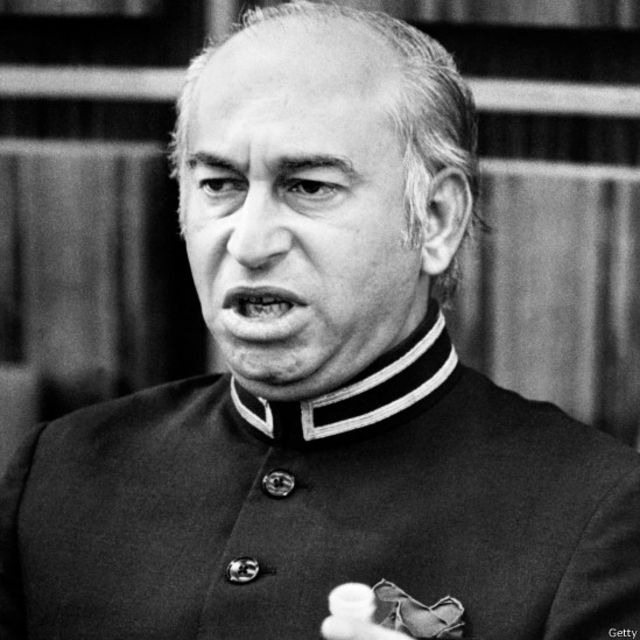
Zulfiqar Ali Bhutto remained the most popular political leader of Pakistan even after his life and death
News Time
Political tensions in the rest of the country were at their peak after the East Pakistan tragedy when Zulfiqar Ali Bhutto was sworn in as the country’s first president and civilian martial law administrator on December 31, 1971 because the country was unconstitutional. West Pakistan’s opposition leadership was disgusted and bitterness was at its height. In such an environment, Bhutto started talks with his biggest political opponent and within a few months gave the country an interim constitution. This one step alone improved the atmosphere and in a short span of one year, what had not happened since the establishment of Pakistan, that is, a unified constitution. Political battles continued in their place, but today, 73 years later, despite the deterioration, even the great dictators did not have the courage to come up with a new constitution. Zulfiqar Ali Bhutto remained the most popular political leader of Pakistan even after his life and death. He had many supporters and opponents but what distinguished him from others was his courage and denial of NRO even on the gallows. But his style of governing was highly controversial. Nevertheless, on all important occasions, he took the opposition into confidence, whether it was a visit to India or the Islamic Summitsuccessful negotiations with the Pakistan National Alliance of the Opposition in 1977 during the launch of the nuclear program and the anti-self movement. Unfortunately, the then Army Chief General Zia-ul-Haq still imposed martial law on July 5.
After Bhutto’s execution, it was not easy for Begum Nusrat Bhutto and Benazir Bhutto to form a political alliance with those who supported Bhutto’s execution. That is why the first meeting was held at Karachi Press Club, not at 70 Clifton. There was talk of forgetting bitter memories and moving forward and in 1981 the Movement for Restoration of Democracy, MRD came into being. Elections were held in 1985 on a non-partisan basis. The MRD made the mistake of not participating, and an anonymous politician, Muhammad Khan Junejo, became the prime minister, a job he did in his short tenure that surprised even his opponents and General Zia. He restored civil liberties, liberated the press, which General Zia was not happy about, but political tensions were greatly reduced. Benazir Bhutto announced her return. Junejo proved to be a weak but courageous ruler who had to pay the price. When he was removed from power by the infamous 58-2B, someone asked him what would you do now? Answered, rest at home.
Maybe that will improve the country. From 1988 to 2002, Benazir Bhutto and Nawaz Sharif were the worst opponents of each other, which was taken advantage of by non-political forces on the one hand and governance issues on the other. As a result, governments would be fired in 18 to 23 months. In the end, what were feared happened the end of Nawaz Sharif’s government on October 12, 1999 and then a long period of military rule. Eventually, both the politicians regained consciousness after being injured and signed the Pact of Democracy by admitting their mistakes. Later on, Benazir made a big mistake of NRO but still both the countries came back but some people did not like this alliance and on December 27, 2007 Benazir was martyred shortly before the election. Imran Khan became the center of attention all this time. He benefited the most from the friendly opposition between the PPP and the PML-N and soon emerged as the sole leader of the opposition. He drew the attention of Pakistan’s middle class with his anti-corruption rhetoric. From 2011 to 2013, Imran had emerged from Karachi to Khyber as an authoritative political leader.
For the first time in the KP, his government was formed, which is still in place today. But his eyes were on the center. The non-political people who saw Imran as a better option and decided to support him silently, despite all their efforts, could not reduce Nawaz Sharif’s influence in Punjab and vote bank. Probably Mustafa Kamal and Khalid Maqbool themselves can testify to this. Imran has been in power for the last two and a half years and civil-military relations are good. Maybe they want to maintain political bitterness.
Let them do nothing but set an example of good governance. The recent by-elections are a lesson for them. The recent results in Sindh, Punjab and Nowshera are a reaction to rising inflation. It is not known whether Khan will go for local body elections after that or not, but according to Fawad Chaudhry, if the captain is strong in the country and weak in Punjab and KP, then a party like Muslim League needs to go against PTI. We are enough. As for the permanent rulers, the current political tension is by no means good for the country. It is better to be neutral because our challenges are big. Let change in politics and governments come in a democratic way instead of coming here and there. The same request is made to the judiciary that in the last 73 years, the confidence of the people has decreased due to the need for ideology. Good and bad politics should do the job. People are aware. Imran is part of a political process. Popular leaders do not go by executions and conspiracies; they go by a set procedure that must continue. Imran has the right for five years, but create an environment for his presence.



